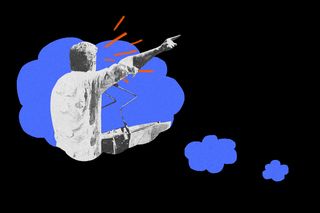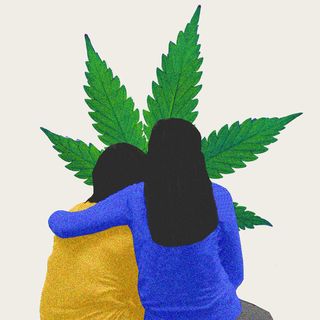
How Political Biases Can Create False Memories
Nearly a third of the participants in a study claimed that they remembered an event that had never actually happened.

A hypothetical scenario: U.S. President Joe Biden ordered senior military officials to “find something to drone strike” to shuffle media attention from the messy Afghan extraction mission, according to a leaked document from 2021. Did this really happen? How likely is one to believe this and stow it away in their memory box?
The answer lies in one’s political disposition and how strongly one feels about this. New research shows that partisan biases — maybe with an ideology or a party — may make people more susceptible to holding false memories, just like this one.
Published in the journal Political Psychology recently, the study adds to a growing canon of literature outlining the prevalence of false memories. People misremember events all the time; memory is imperfect and malleable, never an accurate recollection of our past.
But these errors are not always random — with politics being one of the things that influence the creation of false remembrances. “Individuals are often quite confident that their memories of certain events are a precise, time-stamped logbook of what actually occurred. Psychologists have long known that this isn’t the case; recollection is prone to falsity,” study author Miles T. Armaly, an assistant professor at the University of Mississippi, told PsyPost. The findings show just how easily memories can be manufactured with deliberate intent.
Armaly, along with others, conducted experiments to understand if people’s false memory had any link to their political ideologies. “… partisanship biases our memory of political events such that we (falsely) ‘remember’ events that are favorable to our in-group (or disfavorable to the out-group), and do not recall events that are disfavorable to our in-group (or favorable to the out-group),” Armaly added. People remember things — even if they didn’t happen — but are favorable to the political party of their leaning. Not only that, but people are also more likely to dismiss or forget events that harm the political group they align with. For instance, a supporter of India’s ruling government, the Bharatiya Janata Party, may falsely remember a welfare scheme or government policy that helped people, and is equally likely to forget the blunders (like the mismanagement of a pandemic).
Related on The Swaddle:
How Photographs Influence Our Memories
To show the link, the researchers conducted two sets of experiments. The first was conducted in 2019 and included around 800 participants; the second was conducted two years later in 2021, and included more than 900 participants. They presented a series of fabricated and genuine events, and asked participants to respond with these options: “I remember seeing/hearing this,” “I do not remember seeing/hearing this but I remember it happening, “I remember this differently,” “I do not remember this,” or “I do not have a specific memory of this but I believe it happened.” The inclusion of the last answer was specifically there to distinguish false memories from false beliefs.
They were shown either the aforementioned vignette about President Biden, or were exposed to this one: “In February 2021, an anonymous national security official leaked a 2020 phone call between U.S. Senator Mitch McConnell and President Trump in which Trump admits to McConnell regarding the election, ‘there was no fraud…but we need people to believe it if we’re gonna win big in the 2022 midterms.‘”
People’s responses were telling: As many as one-third of the participants said they remembered events that never happened. The pattern seemed to be that Republicans falsely recalled events that showed Trump in an advantageous light and were censorious towards the Democrats, and vice versa.
One would be surprised at how easy it is to create false memories in people. In a 2015 study, researchers presented a series of wrong details, used some memory-retrieval techniques, and were able to mangle the memory of participants over a course of three hours. By the end, the participants were convinced of perpetrating crimes as serious as assault when they were teenagers.
Related on The Swaddle:
Why People Falsely Believe Something Happened – When It Didn’t
We know political partisanship influence people’s beliefs, behaviors, and how they interpret and respond to everyday events (such as the Covid19 policy). Similarly, “partisanship conditions the interpretation of information (e.g., whether, say, 1,000 casualties of war is a large or small amount),” Armaly added. In 2019, another study looked at fabricated memories in the week preceding the 2018 referendum on legalizing abortion in Ireland — finding that participants reported remembering events that had never happened.
Political partisanship is thus an important variable to factor in while thinking of the past. This link then means two things: that an attachment to a party not only changes the way we perceive new information but also, and more critically, “how we recall (supposedly) existing information.”
But arguably, there are certain limitations with any research around memory and its roots. To what extent is a memory true, and to what is it false? Alamy admits that establishing any certitudes about memories and falsehoods is “made even more difficult in the political context, where one’s estimation of truth or falsity is a function of existing beliefs about the world.” Moreover, questions about why people falsely remember one thing (like Covid19 policies) and not the other (politicians’ spurring of riots) are still questions left unanswered.
Yet, the implication is rather nefarious. People in power can leverage this psychological attachment, unconsciously leading people to create memories of events that support the political ideology but that never happened. More worryingly, research has shown that people who hold false memories are more likely to believe fake news. In this study too, people falsely remembered say, a scandal, against the opposition party. “Memory is a reconstructive process and we are vulnerable to suggestion distorting our recollections, without our conscious awareness,” Gillian Murphy, of University College Cork and one of the researchers, said then.
False memories can very directly and significantly contribute to the crisis of misinformation we find ourselves caught amid. Between truths, half-truths, and falsehoods, we lose sight of the big picture — the big lie we are being programmed to not only believe in, but also remember for posterity.
Saumya Kalia is an Associate Editor at The Swaddle. Her journalism and writing explore issues of social justice, digital sub-cultures, media ecosystem, literature, and memory as they cut across socio-cultural periods. You can reach her at @Saumya_Kalia.
Related


Cannabis Users Are Likely To Be Nicer, More Empathetic: Study
